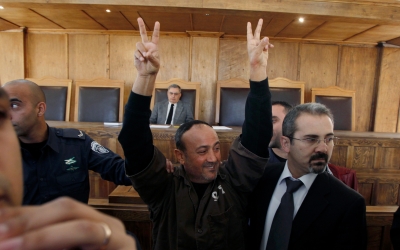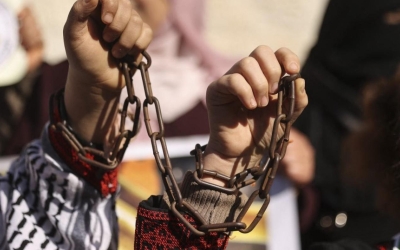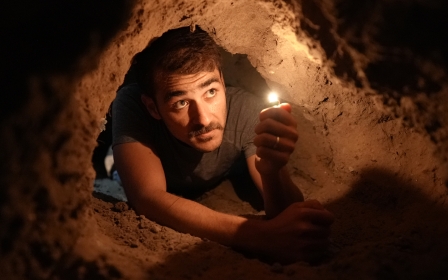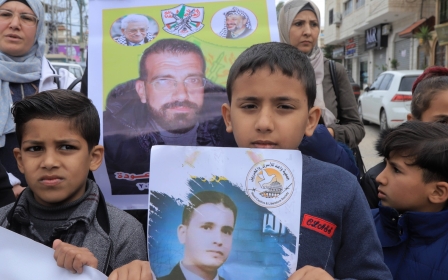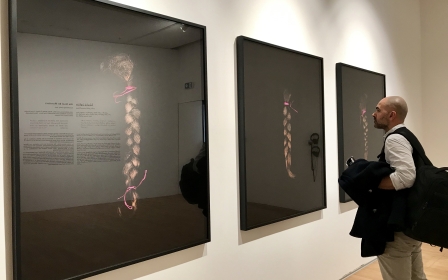Marwan Barghouti: An intimate film of an extraordinary man
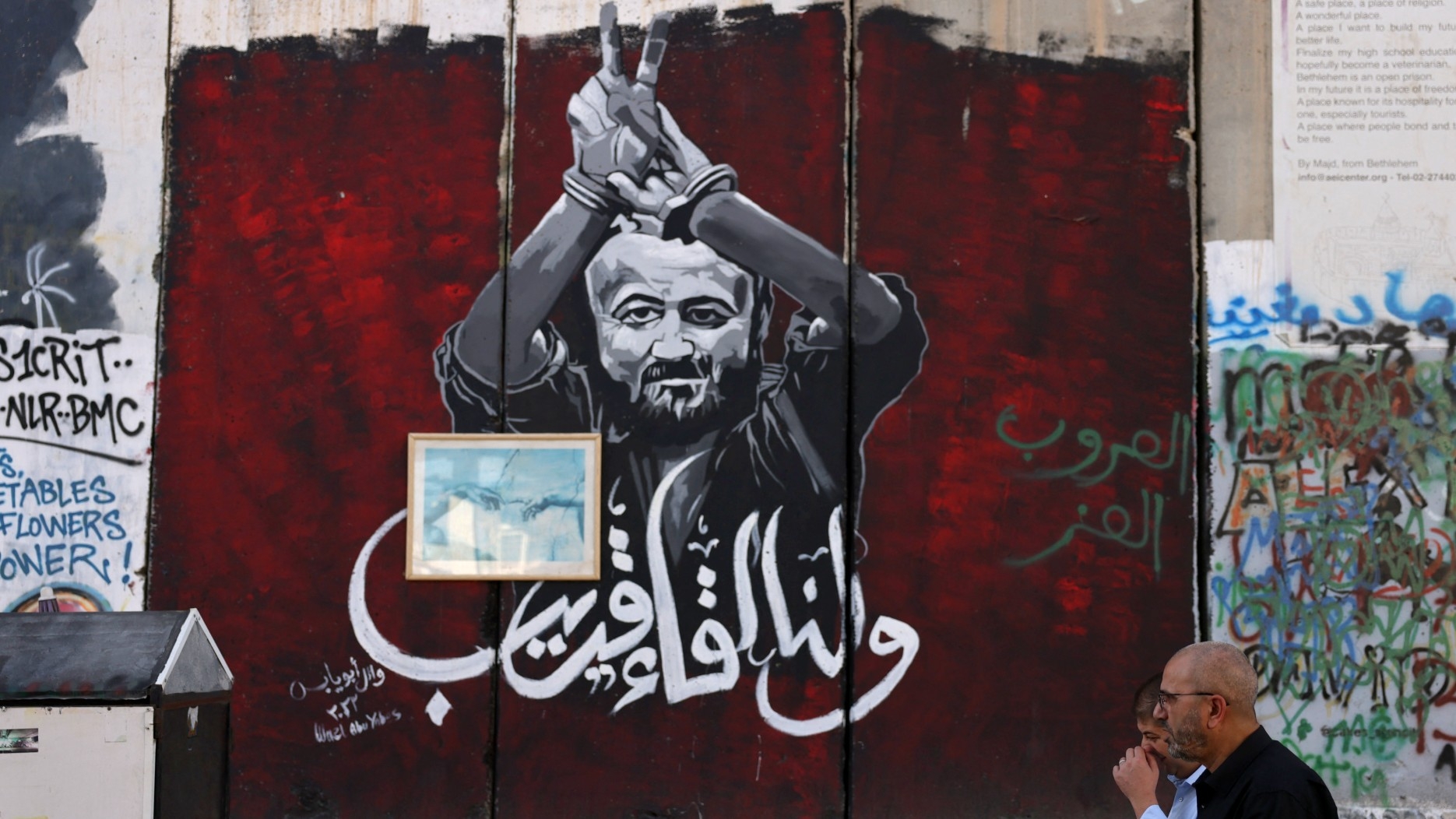
Abdul-Rahman Bassem al-Bahsh, a 23-year-old from Nablus, was killed on 1 January in the Israeli prison of Megiddo, the fourth to die in that prison and the seventh prisoner to die since 7 October - an unprecedented number.
Since 7 October, as many as 4,700 Palestinians have been arrested in the West Bank and East Jerusalem, and at least 1,000 prisoners seized in Gaza, where hundreds have disappeared, including dozens of women.
Amnesty International and four Palestinian human rights organisations have been reporting "systematic abuse", with violent assaults, beatings, kickings, cigarette burns and more in "a human rights crisis in Israeli prisons".
Ayman Lubbad from the Al Haq human rights organisation was among those seized in Gaza. He spoke of his "inhuman and degrading treatment", spending days blindfolded, sitting on his knees, and with little food while held in a makeshift pen.
Prisons in Israel have been for decades an unseen centre of Palestinian political life. And the dignified and unintimidated young prisoners released in the Israeli hostage swaps in November gave outsiders a rare glimpse into that unique world.
New MEE newsletter: Jerusalem Dispatch
Sign up to get the latest insights and analysis on Israel-Palestine, alongside Turkey Unpacked and other MEE newsletters
Today, the future of destroyed Gaza is being discussed in government offices across the world, and preposterous schemes are being put forward, mostly by people who know nothing of Palestinians.
Palestinian prisoners, currently cut off from lawyers, family visits and information, are a political force that will not disappear in that future, as many would like.
Jailed, then exiled
A new film, Tomorrow’s Freedom, opens that window with the story of Palestine’s best-known political prisoner, Marwan Barghouti, often compared with Nelson Mandela, a prisoner labelled a terrorist and meant to be forgotten in prison.
Barghouti is in the 23rd year of a prison term of four consecutive life sentences plus 40 years. His giant stencilled portraits are everywhere on the apartheid walls across the West Bank, in streets in Gaza and Beirut, and in the Palestinian refugee camps in Lebanon and Syria.
He was a leading figure in the First and Second Intifadas, the founder of the al-Aqsa Martyrs' Brigade, secretary general of Fatah in the West Bank when he was arrested, the leader of a hunger strike of 1,500 prisoners in six jails in 2017, and an elected member of the Palestine Legislative Council from prison.
Polls have shown he would be a leading candidate for president even still in prison.
Decades ago, Barghouti was jailed and then exiled in Jordan. Allowed back after the Oslo Accords, he worked supportively alongside Yasser Arafat for the promised new peace. But he was the target of two failed assassination attempts in 2001.
Other Oslo activists were not so fortunate - medical director and Fatah secretary-general in Tulkarm, Thabet Thabet, was assassinated by Israeli undercover units on 30 December 2000 as he left his house in Rabin, near Tulkarm.
The Second Intifada (2000-2005) had begun just three months before, after Ariel Sharon’s provocative visit with an army escort to the al-Aqsa Mosque compound.
'Major, cohesive force'
Tomorrow's Freedom opens with Moqbel Barghouti telling the story of his 11-year-old brother Marwan’s tears when his beloved dog was shot by the IDF near their family house in Kobar village near Ramallah. "This was the story of the occupation - taking things that he loved away from him, things that he loved the most."
The film, shot over three years, shows how the taking away of Marwan’s freedom and of his beloved family, like the killing of the dog decades before, has moulded a remarkable man.
Integrity, courage, leadership qualities, and years of rigorous self-education have made him, many think, the man who could unite Palestinians in the West Bank and Gaza. He earned a PhD while in prison and reads and speaks Hebrew as well as Arabic.
The film has old footage from more than 20 or 30 years ago, of a smiling young Marwan at the centre of the dangerous Palestinian street confrontations with the Israeli army in the First Intifada days of 1987-1993, and as a young and eager politician who wanted to talk to everyone about the route to peace through ending the Occupation.
Interviews in the film show views on Marwan mostly from personal experience from a distinguished group of Palestinians, such as academic and politician Dr Hanna Nasir, until last summer chair of the trustees of Birzeit University; academic and politician Hanan Ashrawi, and lawyer Diana Buttu.
There are also Israelis such as former minister Yossi Beilin, lawyer Lea Tsemel, author Jeff Halper and journalist Gideon Levy, plus the French ambassador in Israel.
South African leaders including Nelson Mandela, the late Desmond Tutu; and Americans such as President Jimmy Carter and Professor Angela Davis, speak of Marwan with great respect.
Professor Nasir speaks of him as a "major, cohesive force". Beilin's words - "he is not a terrorist, he’s a political leader" - are echoed across the spectrum, from the Argentinian winner of the Nobel Peace Prize in 1980, writer and activist Adolfo Perez Esquivel, to gaunt former Palestinian prisoners who were with Marwan in 2017 on the 42-day hunger strike for dignity and better conditions for prisoners.
Torture and beatings
The film’s courtroom scenes from his trial in 2004 show Israelis yelling at him: "Terrorist! Murderer!"
French lawyer Simon Foreman, who represented the inter-parliamentary union observing the trial, says gravely: "It is impossible to regard it as a fair trial. Two points in his treatment stand out: against international law, he was taken over the border into Israel, and he was tortured, including being sat on a chair which had a back studded with nails, which pierced his back if he leaned backwards, during many hours of interrogation; also, the judge openly accused him of being a terrorist even before he was tried."
Marwan’s wife, Fadwa, herself a lawyer, says in shock at the verdict, that she was expecting perhaps a five- or seven-year sentence, a maximum of 10.
Fadwa is shown in later years addressing huge rallies in Palestine for her husband, often using his words written from prison, and being teargassed by Israeli soldiers.
She has travelled widely speaking for Marwan. And, in October 2013, footage shows her in Mandela’s cell on South Africa's Robben Island, launching the international global campaign to "Free Marwan Barghouti and all political prisoners", led by the Ahmed Kathrada Foundation, honouring a man who spent 26 years in apartheid South Africa’s prisons.
Marwan was like a brother to the South African veterans of the long anti-apartheid struggle - they too suffered character assassination and the tags of communist and terrorist
Kathrada was also the person who started the first Free Mandela campaign, before joining his friend for long decades in prison.
Assassinations, mockery of justice in court, harsh prison conditions, loss of family time, and being characterised as a terrorist, were the everyday realities of the South African struggle against apartheid. Marwan was like a brother to the veterans of the long anti-apartheid struggle - they too suffered character assassination and the tags of communist and terrorist.
Prison time is extraordinarily common for Palestinians, with a million people arrested since 1967, and regular reports by rights groups of ill-treatment, torture, beatings and abuse, including of children and women.
Prison is part of almost every family’s and every community’s experience. Ten thousand children have been in military detention in the last 20 years, according to Save the Children. Every Palestinian can identify with Marwan’s thousand days of solitary confinement, the long hunger strike and the years of being denied family visits.
Checkpoint humiliations
Prison has been a particularly acute issue since 7 October, with the unprecedented number of Palestinians held doubled from 5,200 in the first two weeks. Thousands of detained workers were then sent back into Gaza under the bombing. The new arrest campaigns exploded. Many prisoners are held under administrative detention, meaning they are often held for years without trial.
The film’s intimate scenes of Fadwa meeting a young, released prisoner and breathlessly asking him if he saw Marwan and how he was, reveal her deep pain and how very much she misses him, and also the young man’s pride in having been with Marwan.
One scene shows her preparing carefully for a promised visit after years of not being allowed; she is smiling and packing a heavy bag of books, which, she says, is what he wants more than anything.
The long drive in the Red Cross bus, among all the other women, children and elderly men is many hours of anxious anticipation. Fadwa describes the routine of a 5am start and a day full of humiliations at checkpoints and in the prison itself, which ends at home around 8pm.
One filmed scene shows her getting back on the bus outside the prison, her face set. And it takes a moment for the viewer to realise that she was not allowed to see him. It is unbearable seeing her wheel the heavy bag of books back into her house.
By then the viewer has seen Fadwa at home, with her three sons, Qassam, Sharif and Arab, and their daughter Ruba.
The strong, efficient campaigner has a soft face in domestic scenes with grandchildren in her arms and the warm united family she has held together alone for these decades.
Her husband has missed graduations, marriages, and the births of grandchildren. Fadwa listens to her eloquent, highly educated three sons talking about their father, cuddling new babies, living responsible lives, and the viewer is given a glimpse of extraordinary unified family strength.
'Eyes so bright'
In another Red Cross bus on another day, after the hunger strike, two of the brothers, Sharif and Arab, can hardly contain their excitement as the prison comes near. Sharif has not seen Marwan for 18 months, Arab for three years. (Qassam was four years in prison and saw his father then, but there are no visits for an ex-prisoner.)
The brothers talk of rationing the precious minutes of the visit, there is so much to say: five minutes for family news, seven for Arab's experiences studying in the US, and they will keep 15 for all the other people who will want to greet Marwan. "They love him, and he feeds from them."
They emerge elated from their father’s hands on the glass greeting them, thin, but with 'his eyes so bright'
They emerge elated from their father’s hands on the glass greeting them, thin, but with "his eyes so bright". They call their mother from the bus, relaying every detail.
The atmosphere of these Palestinian lives dedicated to fighting the occupation through disciplined prison education as the path to peace is rarely evoked for English-language speakers.
It is enhanced by the unmistakable voice of Mahmoud Darwish reading from his iconic poem, We Have On This Earth What Makes Life Worth Living, of love and life in the shadow of Mother Palestine. The specially composed music of Brian Eno, the English musician and advocate of many humanitarian causes, is another strand of beauty.
The filmmakers, Sophia and Georgia Scott, first saw Marwan’s face while working in Beirut and saw him everywhere on the walls of the Shatilla camp. Curiosity led them to explore his story, and meet Qassam. The film followed.
One of their producers is Sawsan Asfari, who has been behind such original films as Annemarie Jacir’s Wajib in 2017, and Queens of Syria in 2014.
Distribution of Palestinian films is, Asfari says, "challenging, and it needs courage, conviction and collective effort, which get us there in the end".
The views expressed in this article belong to the author and do not necessarily reflect the editorial policy of Middle East Eye.
Middle East Eye delivers independent and unrivalled coverage and analysis of the Middle East, North Africa and beyond. To learn more about republishing this content and the associated fees, please fill out this form. More about MEE can be found here.



